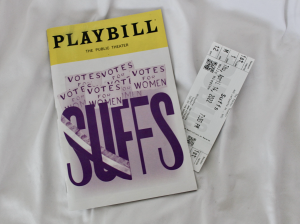Alison Leiby’s ‘Oh God, A Show About Abortion’ Resonates With Audiences
The political comedy at the Cherry Lane Theatre tackles motherhood, reproductive rights and more
COURTESY OF MINDY TUCKER
Alison Leiby put on a stand-up one-woman show about health-care access, motherhood, and of course, abortion.
August 25, 2022
“Oh God, A Show About Abortion” is not your traditional stand-up. It is a one-woman political comedy that follows the abortion story of Alison Leiby, a Brooklyn-based writer and comedian, who touched on the stigma surrounding womanhood and motherhood. The show also discussed the lack of equality in health care access and the social and political weight placed on the abortion debate in America.
Debuting at the Cherry Lane Theatre on April 25, the 70-minute show is a genuinely funny and informative commentary on the experiences connected to Leiby’s lack of desire to be a mother. She notably told the audience that a myriad of experiences, both physical and cultural, make up the umbrella of motherhood, but it was not an experience she desired.
Leiby, who was 35 years old at the time, was on tour when she noticed that her period had been late. She wandered the fertility aisles of a Missouri CVS in 2019 looking for a pregnancy test. After seeing the positive result on her pregnancy test, Leiby told the audience that she tried to register her next steps. She noted that there is “no guide for what to expect when you’re expecting to stop expecting.”
Her abortion story was not a significant portion of her monologue. She described her time at Planned Parenthood as “anticlimactic” and focused on addressing several topics relevant to her experience as she weaved in and out of the story. Throughout the show, Leiby touched on the meaning of motherhood and its relation to womanhood and posed the question: “If I am not a mother, then what am I?”
She delved into the discussion of how motherhood and womanhood can almost be used interchangeably when referring to the achievement of societal milestones, leading to questions of worthiness and accomplishment for people who do not see children in their future.
“I don’t want kids,” she confidently told the audience.
She described herself as a 38-year-old writer with too many house plants who doesn’t pay her taxes on time and asked if that was enough. She also added that she was a woman that did what she had to do to protect the life that she had built for herself.
Not everyone wants to be a mother and that should be OK too.
Responsibility was a topic Leiby covered in relation to motherhood as she jokingly assured the audience that she couldn’t keep her luxury plants from GRDN alive and, in turn, had no interest in being a mother.
Leiby’s monologue and performance style are sardonic, causing the audience to erupt in laughter several times throughout the show. Even with its limited crowd work — except for one moment where Leiby jokingly looked to an audience member and asked if they have ever had a near-lethal blood clot from a birth control pill called Yaz, to which the audience member exclaimed “Yes!” — Leiby’s story is one several people can relate to and resonate with.
In between laughs, I found her words to be extremely powerful. Leiby was able to share her story in a manner that allowed people to appreciate her transparency and learn from her story. Not everyone wants to be a mother and that should be OK too.
The Cherry Lane Theatre’s small venue made the show feel even more inclusive, especially given the unspoken understanding of the reality taking place outside the theater’s doors.
Since the show’s debut, the political comedy has survived the unintended leak of Dobbs v. Jackson Women’s Health Organization on May 2, followed by the Supreme Court’s official 6-3 ruling that overturned the precedents of both Roe v. Wade and Planned Parenthood v. Casey on June 24, abolishing the constitutional right protecting access to abortions.
Even with all of the topics addressed, Leiby managed to find and maintain a light-hearted balance which got her points across to the audience in a way that didn’t feel instructional. Two minutes would not pass before Leiby had delivered another joke about her inability to take care of house plants, a realistic look into a birth control commercial for women, or suggestions for period tracker apps to be named after relatable board games “Sorry” and “Trouble” instead of the existing apps “Life” and “Clue.”
The political comedy’s closing date is Friday, Aug. 26, with the last showing taking place at 7 p.m. at the Cherry Lane Theatre in the West Village.
















